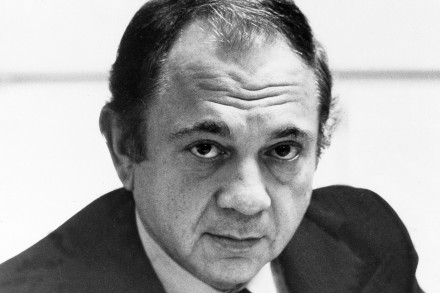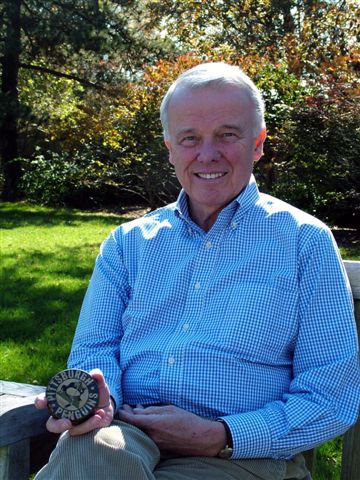
Legendary political guru David Garth passed away on Monday. As his New York Times obituary points out, he was an innovator, a godfather of campaign consultants, having furthered the elections of New York City mayors John Lindsay, Ed Koch, Rudy Giuliani and Michael Bloomberg. He was the media brain behind New York governors Hugh Carey and Mario Cuomo and United States Senators John Heinz and Arlen Specter. But “the most attractive candidate” he ever handled was Bridgeport resident Jack McGregor, co-founder of the Bridgeport Bluefish, who served as a Republican in the Pennsylvania State Senate.

As I pointed out in a book project on behalf of McGregor’s Forrest Gump-like career, Garth elevated campaign strategy and message to a whole new level of sophistication, inventing spin before spin was a political catch phrase. For a political junkie, meeting and listening to Garth is like a 10-year-old Yankee fan playing catch with Derek Jeter, the enjoyment of his presence like a magic carpet ride to the past and a bridge to the future. Thanks to the book project with McGregor I had a chance to meet Garth on several occasions including one memorable day on August 12, 2005 in a joint interview with McGregor and Garth in the famed Manhattan steakhouse Sparks, a place where a few political deals have been cut through the years.
McGregor and Garth talked about their times together from politics in Allegheny County, Pennsylvania to consulting treks in Africa including a life-changing ride in the private aircraft of President Mobutu of Zaire.
Excerpts from that conversation follow.
Q. In 1962, what possessed you to handle Jack’s campaign for State Senate in Pennsylvania?
Garth: We talked a lot about Jack running. On one of my periodic trips to Pittsburgh, he picked me up at the airport and we started to talk seriously about him running for office. Jack was one of the great potentials. He had nothing negative in his record. It would be a gutsy move because nobody knew him.
Jack: In 1961 David and I had lunch at the Harvard-Yale-Princeton Club in a little historic red brick building next to the Alcoa building in downtown Pittsburgh. I was bringing David up to date about my thoughts for running for public office. We came to a decision on two different items that had troubled me. One was should I run the next year while in my senior year in law school, or wait three or four years. David did not listen to any thought of waiting. I was a senior in law school and a scholarship student with a young family. David said if you wait a few more years you will be perceived as just another young attorney building up his name for his law practice. I also wondered if I should run for state representative or state senator. David would not listen to the thought of me running for state rep.
Garth: I liked the word senator.
Jack: It was more unique for a student to run for the senate rather than state representative.
Garth: I don’t know anyone who saw Jack in that first campaign who didn’t think he wasn’t a sure bet for the future. He was young, smart, good-looking and well mannered.
Q. Had you contemplated a career as a political consultant or was this just a case of helping a friend?
Garth: It was a little bit of both. Jack was the first “big” campaign I did. Around that time I would go down to Washington about once a month to work with [Congressman John] Lindsay who was preparing a run for mayor of New York City three years later. So I was working with Lindsay and Jack, but Jack’s election year was first up. I always loved politics. My mother and father were liberal Democrats. I didn’t give a damn about the party label. Jack was a friend and I thought we’d have some fun. That’s how it began. That night we talked in the car all we did was laugh. We were making up campaign slogans. Some of them we eventually used. “He’s Independently Worthy.” Another was “His four kids just endorsed him.”
Q. Jack was in a solid Democratic district for his first run. Did you focus on independent voters for the general election to make up the difference or was the focus on convincing some Democrats?
Garth: We didn’t have that much theory behind it. I was just trying to grab whatever we could get. I thought he was very attractive, but nobody knew him so the idea was to get him exposed. A great asset was his background in the Marines and also a Yale graduate. Jack was superb on his feet. Everybody kept saying he reminds me of Jack Kennedy. He was a young, attractive candidate. Jack was the perfect guy to run against a machine candidate.
Jack: Kennedy running and winning the Presidency in 1960 was a key reason that I stepped up my interest in running sooner than later.
Garth: Absolutely right. That was one motivation I had for pushing him. I never had a doubt about Jack winning. I could have killed the SOB when he decided years later not to run again.
Q. How far could Jack have taken his political career?
Garth: I’ve always felt that there was literally no limit where Jack could go. It was only a question of timing. I had no doubts at all about Jack becoming U.S. senator from Pennsylvania. You have no idea how attractive a candidate he was. Jack was the most attractive candidate that I ever handled. He was unbelievable on his feet, in front of a crowd, phenomenal. I got a lot of credit for helping his career. The truth of the matter was I think he would have done at least as well without me. He was a dream candidate. One of the reasons (Pennsylvania governor) Bill Scranton was attracted to Jack was because Scranton wanted Jack for his purposes. Jack was the best possible guy to represent Scranton. When you sent Jack out to talk to people he had the audience immediately. He charmed them. Jack was Scranton’s golden boy.
Q. What’s your favorite Scranton story?
Jack: Scranton had put me through hoops while he was assembling the statewide Republican ticket for 1964, two years after I was first elected, when state treasurer and state comptroller were up. Over a period of two or three months, he moved me from a no, to a maybe, to an okay if I approve of a running mate. Then, due to some political problems out east that could only be solved by putting an older Republican out there on the ticket, along with a so-so incumbent from mid-state, Scranton explained statewide wouldn’t work out this year. I was only 29, and had plenty of time to wait.
Garth: We decided to send Scranton a telegram that featured a line I took out of a telegram from a guy who worked in the London office for Life Magazine during World War II. They were bombing the shit out of his building. This guy kept saying to [publisher] Henry Luce you’ve got to get me out of here before I get killed. Luce says don’t worry, when the war’s over you’ll get the head job in London. So the war ends and he doesn’t get the job. So he sends a telegram to Luce, Dear Henry, why did you make me stand on tip toes if you weren’t going to kiss me? We sent that telegram to Scranton, signed by Jack.
Jack: Scranton called me a couple of days later roaring with laughter. He loved the telegram.
Q. What were Jack’s strengths as a candidate?
Garth: He was great looking, well mannered, excellent on his feet, a better speaker than Jack Kennedy. Jack also had great financial friends behind him such as R.K. Mellon, the Rockwell family, the Heinz family and the Hillman family. He had ways of knowing people. Most of my clients came directly or indirectly through Jack–initially R.K. Mellon and John Heinz. Over the years I must have had a dozen campaigns in Pennsylvania statewide.
Jack: Remember the guy I introduced you to on the top floor of the Alcoa Building?
Garth: Oh my God, Leon Hickman, the CEO of Alcoa. Jack really set me up. He says I’m going to introduce you to a serious, classy guy who might retain you. We walk in and the guy’s wearing a purple suit. I thought that my eyes would pop out. I didn’t know whether to laugh or cry. I thought Jack had been drinking. But Hickman loved whatever Jack said.
Q. Tell us more about your disappointment with Jack leaving public service in 1970?
Garth: I thought he was a fool to abandon the career with so much potential. On the other hand I was in a funny position. I always am in these situations where I’m in a position of pushing a guy to do what apparently benefits me. I was close to Jack and his family, the wife, the kids, the whole thing. I was concerned about his financial future. But he had entrepreneurial career hot pants and couldn’t keep them on–always had lots of other things professionally that he wanted to do. I felt there was no level that he could not attain. I thought he would be U.S. senator, governor, and I thought he could go for national office. And because he was a moderate Republican from Pennsylvania I think he would have been a winning candidate for President. He was well positioned. Jack’s actually a difficult person for me to talk about because I just know how strong a candidate he was. Just take my word for it.
Q. Your lives also intersected the private sector such as Jack’s representation of President Mobutu of Zaire. Weren’t you on Mobutu’s private aircraft?
Jack: We were flying on our sides in a helicopter. All I could think of were the stories of Mobutu throwing dissident cabinet members into the Congo River.
Garth: I was looking for the door. There was no door.
Q. Did you try to pull Jack back into public office?
Garth: All the time. I stopped asking when he turned his phone off.


Lennie, this was a nice story about a nice guy. It’s been my pleasure to know him.
Intelligent, a good neighbor looking out for the community-at-large while engaged in business pursuits, fun-loving and what a smile!!! It has been a privilege to know him, even slightly. Still on stage for Bridgeport’s future? Time will tell.
Condolences to Jack on the loss of his long and dear friend Garth. McGregor is a mixture of Gump and George Bailey. It’s a Wonderful Life!